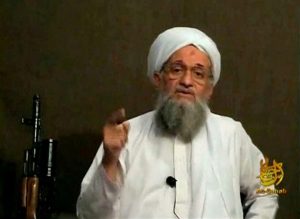 Pakistan’s Inter-Services Intelligence agency (ISI) has been protecting the Egyptian-born al-Zawahiri, a trained surgeon.
Pakistan’s Inter-Services Intelligence agency (ISI) has been protecting the Egyptian-born al-Zawahiri, a trained surgeon.
His most likely location today, they say: Karachi, the teeming port city of 26 million people on the Arabian Sea. “Like everything about his location, there’s no positive proof,” says Bruce Riedel, a 30-year CIA veteran who was the top adviser on South Asia and the Middle East for the past four U.S. presidents. “There are pretty good indications, including some of the material found in Abbottabad,” where bin Laden was slain, “that point in that direction,” he adds. “This would be a logical place to hide out, where he would feel pretty comfortable that the Americans can’t come and get him.”
Karachi would be a “very hard” place for the U.S. to conduct the kind of commando raid that got bin Laden on May 2, 2011, Riedel says. The heavily policed city, the site of a major nuclear complex, also hosts Pakistani naval and air bases, where forces could quickly be scrambled to intercept American raiders. Plus, bin Laden, al-Zawahiri’s late protégé, remains a popular figure among Karachi’s millions of poor, devout Muslims, who could well emerge from their homes and shops to pin down the Americans.
“If he was in someplace along the border with Afghanistan, I think the temptation would be enormous to go after him,” says Riedel, who now heads the Brooking Institution’s Intelligence Project in Washington, D.C. “But in Karachi, that would be stunning and very difficult.”
In the first week of January 2016, the Obama administration went after al-Zawahiri with a drone strike in Pakistan’s remote Shawal Valley, which abuts the Afghan border in a Federally Administered Tribal Area, multiple sources tell Newsweek. But he survived, says a senior militant leader in the region, who, like all Pakistani sources, demanded anonymity in exchange for discussing politically sensitive issues. “The drone hit next to the room where Dr. Zawahiri was staying,” the man told Newsweek. “The shared wall collapsed, and debris from the explosion showered on him and broke his glasses, but he was safe.”
The man added that “four of Zawahiri’s security guards were killed on the spot and one was injured but died later.” He said al-Zawahiri had “left the targeted room to sleep just 10 minutes ahead of the missile that hit that room.” (The CIA declines to comment on drone strikes.)
The White House signaled a new, tougher approach to eliminating al-Zawahiri and his militant allies in early April with the appointment of Lisa Curtis to head the South Asia desk for the National Security Council. A well-known former CIA analyst, congressional staffer and foreign policy hawk in Washington, D.C’s think-tank circuit, Curtis caused a stir in February when she co-authored a piece arguing that the U.S. “should…hold Pakistan accountable for the activities of all terrorist groups on its soil.”